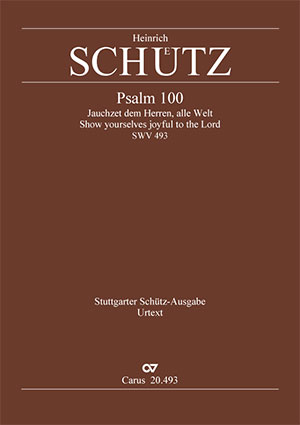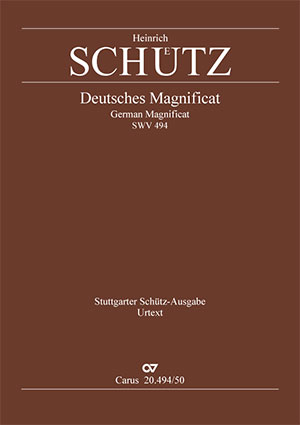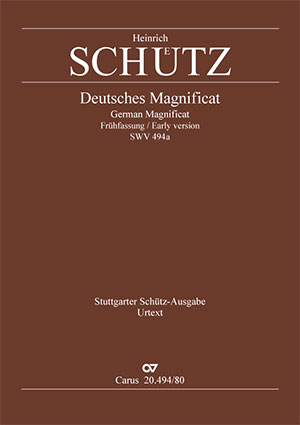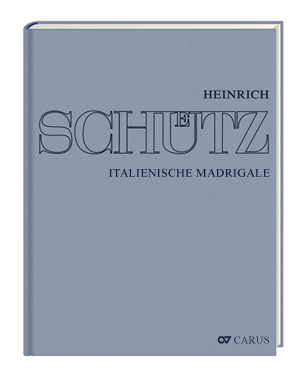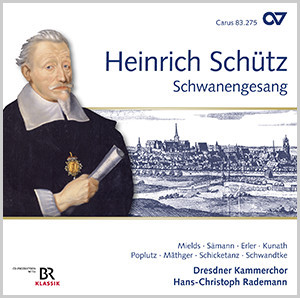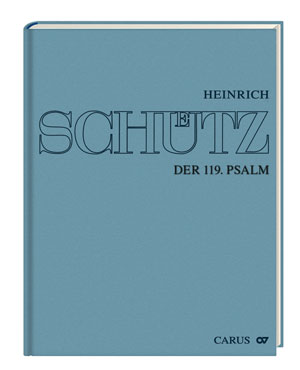
Psalm 119 (Schwanengesang), (Complete edition, vol. 18)
Stuttgart Schütz Edition
At the age of eighty-six Heinrich Schütz composed his last work in 1671 with his monumental setting of Psalm 119, complemented in an appendix with a setting of Psalm 100, and a setting of a German Magnificat. This group of works, called "Schwanengesang" [Swansong], is scored for eight vocal parts, but two were lost so that it is not performable in its surviving form. However, as the composition is in a strictly regular style, and the two choirs often have common motivic material, it has been possible to attempt a reconstruction of the missing material from what survives. In 1984 a version reconstructed by the Dresden Schütz scholar Wolfram Steude was published for the first time, and has been performed many times since then. The new edition by Werner Breig as part of the Stuttgarter Schütz-Ausgabe is another attempt to create a performable version. In the process, other reconstruction options have been suggested for many passages, and in addition to this, some previously undiscovered mistakes have been corrected.
Acheter
Informations complémentaires sur l'œuvre
Sommaire
-
Compositeur
Heinrich Schütz
| 1585-1672Heinrich Schütz is regarded as the first German musician of European stature. As a choirboy from 1599 at the court of Landgrave Moritz of Hessen-Kassel, he received a thorough education. In 1608 he began a law degree in Marburg, but broke this off in 1609 in order, with the support of the Landgrave, to study composition with Giovanni Gabrieli, organist at St Mark’s in Venice. In 1613 Schütz returned to Kassel, but two years later was enticed away by Elector Johann Georg I of Saxony to the Dresden court as “Organist und Director der Musica”, where he held the position of Hofkapellmeister (court Kapellmeister) from 1617 until his death. Schütz’s great cycles of vocal works marked the high point of his reputation in Germany and northern Europe. But these represent only part of Schütz’s output; individual works are represented in printed collections with works by other composers, others only survive in manuscript, and much has been lost. The Stuttgart Schütz Edition makes available Schütz’s complete oeuvre, and all works are also published in practical Urtext editions. Plus d'information sur la personne
-
Éditeur
Uwe Wolf
| 1961Uwe Wolf studied musicology, history, and historical ancillary science at Tübingen and Göttingen. After receiving his doctorate in 1991 he was a research assistant at the Johann-Sebastian-Bach-Institut in Göttingen. From 2004 he worked at the Bach-Archiv Leipzig. There he directed a both research departments, was substantially responsible for the redisigning of the Bach Museum, and he developed the digital Online-Projekt Bach. Since October 2011 he has been the Chief Editor at Carus-Verlag, Stuttgart. He has taught at various universities and also belongs to the editorial boards of several complete editions. Plus d'information sur la personne
-
Éditeur
Werner Breig
| 1932
Critiques
... Oft aber kommt Breig dem schützschen Idiom noch näher als sein großer Vorgänger: Manche Übergänge gelingen ihm nahtloser, manche Stellen - etwa die Musikalisierung der „eitlen Wahrheit” in der zehnten Motette - wirken zugespitzter, glänzender, konzertanter als die Lösungen Steudes.
Sven Hiemke, Musik & Kirche, Mai / Juni 2018
Questions fréquentes sur l'œuvre
 Il n'y a pas encore de questions et réponses concernant cette œuvre ou vous n'avez pas trouvé la réponse à votre question sur l'œuvre ? Cliquez ici et envoyez votre question spécifique à notre service clients.
Il n'y a pas encore de questions et réponses concernant cette œuvre ou vous n'avez pas trouvé la réponse à votre question sur l'œuvre ? Cliquez ici et envoyez votre question spécifique à notre service clients.







